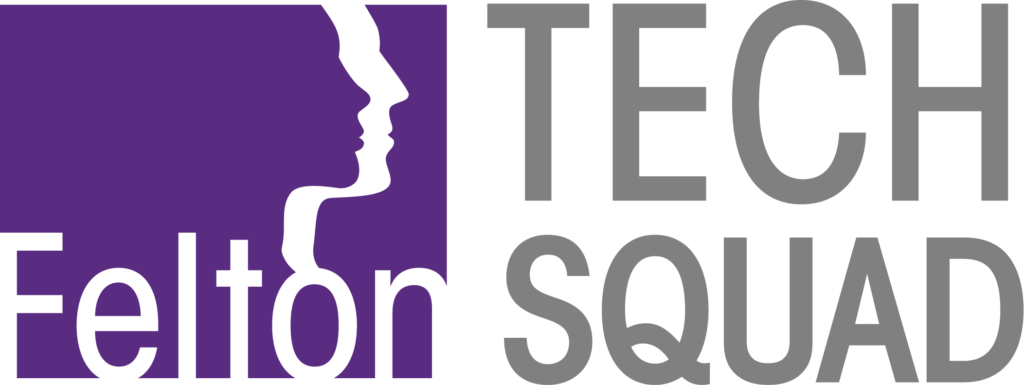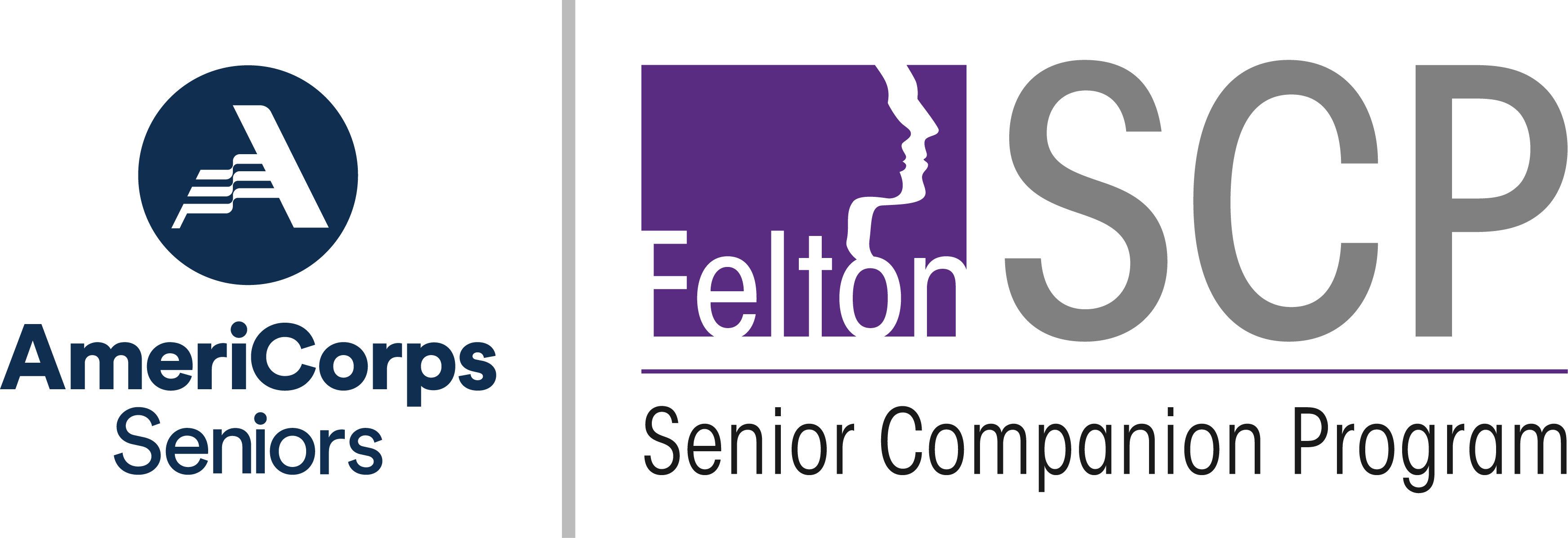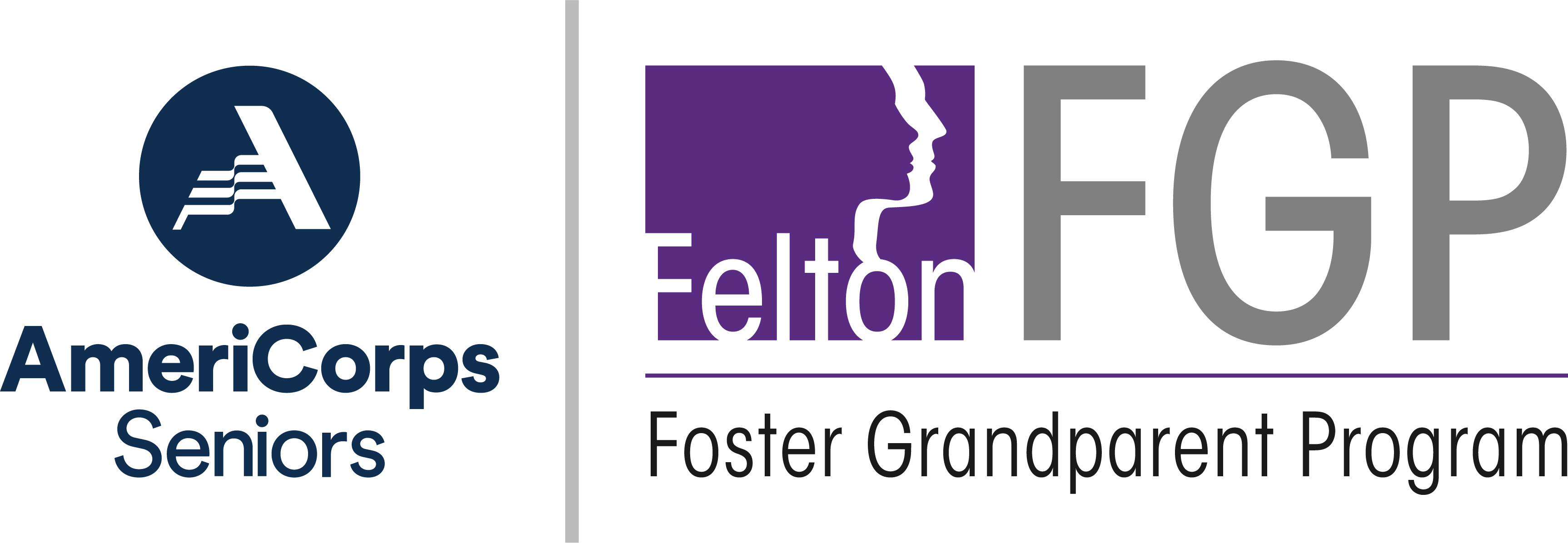People have a way of coming together in times of need. Volunteers step up to donate their time, energy and skills in aid of those needing help. Although the year 2020 may be perceived as one of the most difficult years in recent history, we can unite and support each other, either through our own initiatives or through collectively organized efforts.
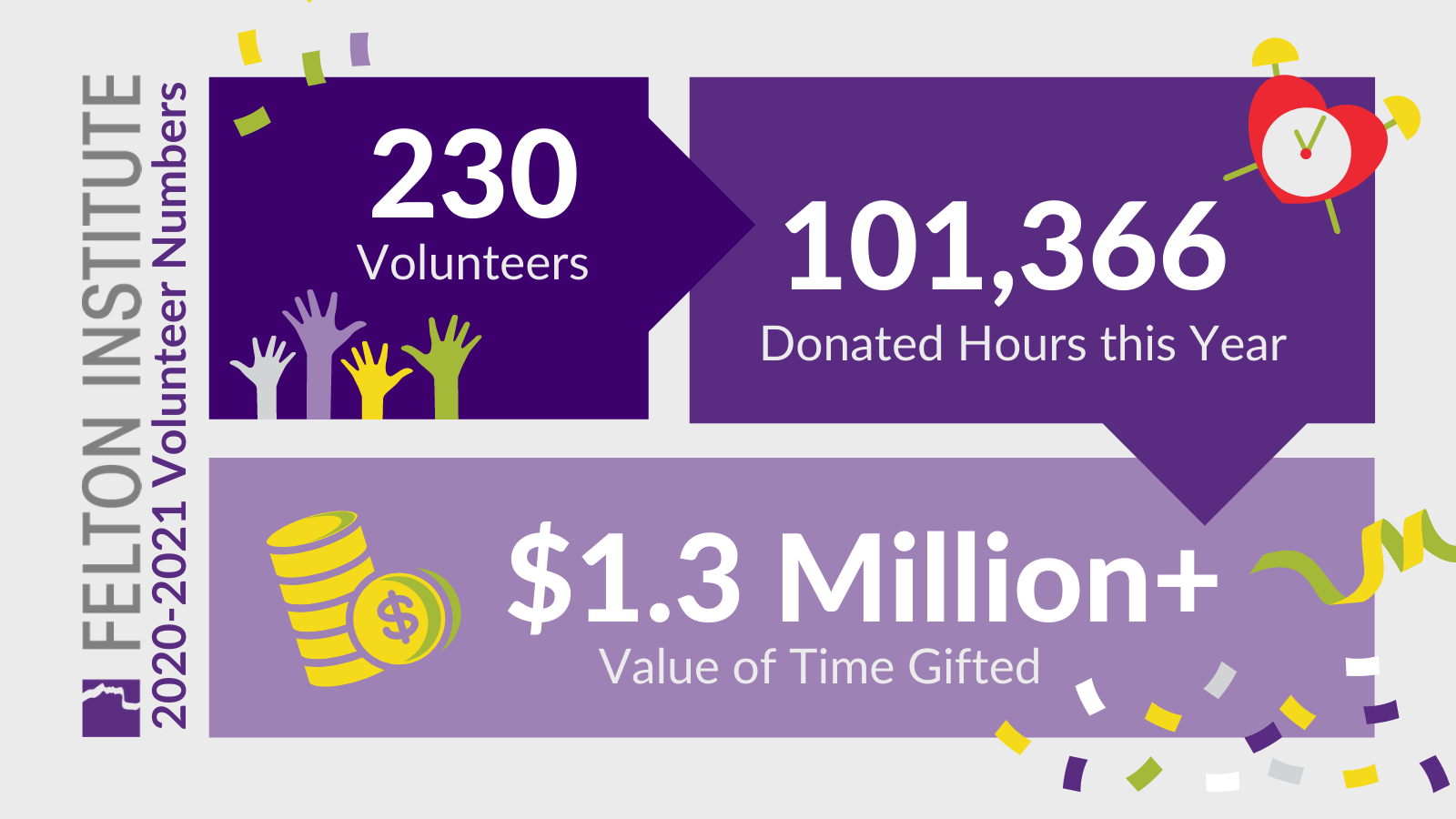
Doing good heals the mind and body.
Scientific studies suggest that helping others might not only help the beneficiary, but also the person performing the act of kindness. People who volunteer experience a boost in their mental health – good news given statistics show that one-third of Americans are experiencing anxiety and symptoms of depression. People who volunteer lead longer, healthier lives. And some experts say that volunteering should be recommended alongside diet and exercise for holistic-mind-body wellness.
Volunteers play an important role in many of Felton Institute’s programs.
In these pandemic times, the most common volunteer opportunities revolve around food banks and charities. Felton Institute has an array of unique volunteer programs that aim to alleviate the needs of overlooked populations. The personal attention that volunteers are able to bring is always appreciated. Here are some opportunities that we hope will guide you to an impactful experience that’s meaningful and right for you.
1. Help empower Seniors Through Technology
As older adults and Seniors stay at home to protect themselves during the COVID-19 pandemic, technology has become an essential tool to stay connected and find services and support to keep the elder community healthy. Tech Squad is a program under Felton’s Senior Division aimed at bridging the “digital divide.” Volunteers will be provided a culturally appropriate tech curriculum to lead small group trainings, coach Seniors on how to access online services, and use of online communication tools. If you enjoy technology, working with older adults, and have the ability to communicate with patience and understanding – consider joining the Tech Squad today.
Volunteer Requirements: Tech-savvy teenagers and adults of any age with computer proficiency and knowledge of Zoom and other communication platforms, technical and problem-solving skills. Proficiency in non-English languages is a plus!
Training Involved: Ongoing through the Tech Squad
Time Commitment: 3 to 5 hours a week, Weekdays between 9am and 5pm
Contact: A Tech Squad Team Member at techsquad@felton.org or call (415) 474-7310 and ask for Tech Squad
2. Become a Suicide Hotline Volunteer
Are you a good listener? Caring? Supportive? Understanding? Do you want a real challenge? If you answered yes to any of these questions, then San Francisco Suicide Prevention may be right for you! As a Hotline Volunteer, you will be providing emotional support in a non-judgmental manner, assessing for risk of suicide, de-escalating crises, and giving information and referrals when appropriate.
Volunteer Requirements: Caring and reliable individuals (age 20 or older) who are willing to commit to emotionally challenging work. Professional, volunteer, or personal experience with mental health issues. Eligible volunteers will complete a phone screening interview, reference and background checks.
Training Involved: 7-week training, which includes classroom, homework, reading, and mentorship
Time Commitment: Immediately following the completion of training, you must take one shift per week for the following 52 weeks or 200 total hours of service. Also needed are one-holiday volunteer shift and attendance of one continuing education seminar (or class). After volunteering for one year or 200 hours, you must commit at least 1 four-hour shift per month to maintain volunteer status.
Contact: Learn more about volunteering with San Francisco Suicide Prevention at sfsuicide.org/volunteering. Or contact the team directly by emailing sfsuicide@felton.org.
3. Protect the Elderly in Long-term Residences
In our COVID-19 era, the need to support seniors living in skilled nursing facilities and care homes is more crucial than ever due to limited communication and in-person visits. With over 2,700 clients served, the San Francisco Long-Term Care Ombudsman Program is a federally-mandated visiting advocacy program where volunteers receive and investigate complaints on behalf of older adults living in long-term care facilities. Ombudsman services are free to residents. Currently, there are 25 active volunteers in this program, and some have been with the program for over ten years.
Volunteer Requirements: Must be at least 18 years old, pass a criminal background check, and be computer literate.
Training Involved: Volunteers must complete the 36-hour training provided for free by the State of California. Completion leads to State Certification as an Ombudsman.
Time Commitment: Volunteers commit to 5 hours per week for at least one year.
Contact: Call (415) 751-9788 or email ombudsman@felton.org to request an application.
4. Assist a Senior in Every Day Life
Some seniors cannot get around on their own and lack the companionship and freedom they once had. Acts of volunteer companionship, whether running errands, delivering a meal, or just stopping by to sit and talk make a world of difference. The Senior Companionship Program (SCP) focuses on reducing the effects of social isolation and loneliness for the elderly. Presently, the program has 26 volunteers, called Senior Peer Counselors, who serve 130 clients. AmeriCorps Seniors volunteers strictly adhere to COVID-19 social distancing and public health guidelines and may also provide alternate services through virtual means to stay engaged with their SeniorBuddies.
AmeriCorps Seniors Volunteer Requirements/Eligibility: Limited-income mobile seniors (age 55 or older) and receive less than $1,985 per month in order to receive a small tax-free hourly stipend.
Training Involved: Ongoing training through SCP and host sites.
Time Commitment: 15-20 hours per week
Contact: Lolita Kintanar Volunteer Coordinator at lkintanar@felton.com or call (415) 751-9786 ext. 239 to request an application.
5. Become a Foster Grandparent
If you’re a senior (55+ older) who loves to work with children, consider becoming a Foster Grandparent. The goal of the Foster Grandparents Program (FGP) is to provide a multi-generational opportunity to Foster Grandparents to serve in schools and various community settings. The AmeriCorps Seniors volunteers become tutors, mentors, and friends to young children. Currently, with about 50 active AmeriCorps Seniors volunteers, the program was impacted when schools and educational centers were closed due to public health safety measures. Our FGP volunteers are currently receiving technical training to provide virtual services to stay engaged with the students as we wait for schools to resume in-person instruction.
AmeriCorps Seniors Volunteer Requirements/Eligibility: Applicants must be age 55 or older and receive less than $1,985 per month to receive a small, hourly, tax-free stipend and transportation reimbursement for their contribution.
Training Involved: Ongoing Training through FGP and host sites.
Time Commitment: 15- 20 hours per week
Contact Information: Lolita Kintanar, Volunteer Coordinator at lkintanar@felton.com or call (415) 751-9786 ext. 239 to request for an application.
Volunteer. Join us and be a force that transforms the world.
With a volunteer workforce of over 230 individuals, donating over 101,366 hours a year, Felton Institute is proud to recognize the impact of volunteerism in building stronger communities. As a volunteer, you choose to invest your time and energy in giving back to a community you know and love.
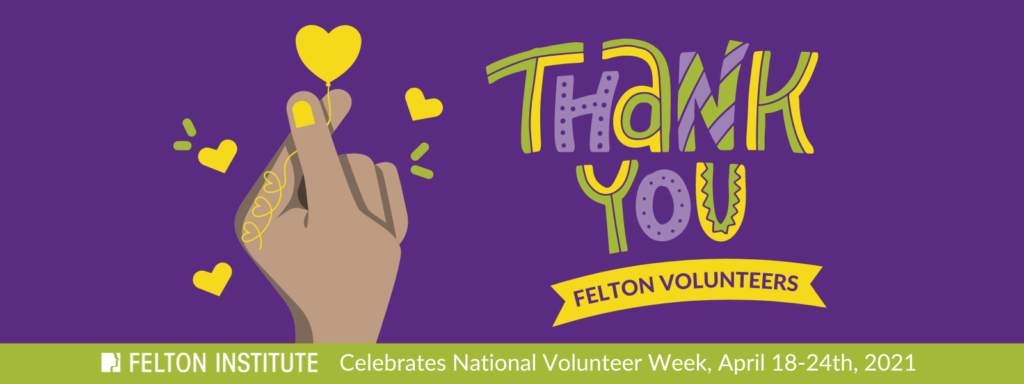
What Some of Our Volunteers Say:
“I love the team behind SFSP. They are among the most caring, compassionate individuals I have ever met. Everyone has their own personal story about why they volunteer here. And being part of this team gives me regular doses of wholesome, raw humanity.” – Liana, SFSP Hotline Volunteer
“Being an Ombudsman gives me the opportunity to apply my best skills. It feels great to be able to sit with someone and listen to their life stories that otherwise might not have been told.” – Volunteer, Ombudsman Program
Not everyone may be available or free to volunteer, but you can still help by spreading the word! Subscribe to this newsletter, share this article with someone who might be interested or consider a contribution to Felton Institute for its programs. Your donation is an investment in Felton programs that continue making our communities stronger during unprecedented times.
You may choose to give to Felton Institute today by visiting felton.org/donate to donate online.
Thank you to all our supporters who make this possible and our wonderful volunteers who share their hearts and time.
About Felton Institute: Founded in 1889, Felton Institute responds to human needs by providing cutting edge, evidence-based mental health and social services that transform lives. Felton Institute is a tax-exempt organization registered 501(c)(3) nonprofit under EIN 94-1156530.
Offering more than 50 acclaimed and honored programs that address homelessness, mental health, prenatal, adolescent, adult, and senior needs, Felton Institute provides services in San Francisco, Alameda, San Mateo, Marin, and Monterey counties. Felton’s social services and programs utilize the latest scientific research, combining cultural sensitivity, deep respect for client and staff, and a commitment to social justice.
Felton is the oldest non-sectarian and nonprofit social services provider in the City and County of San Francisco. For over a century, Felton Institute has been at the forefront of social service innovation, pioneering new approaches to meet underserved populations’ emerging needs. At the heart of our work is the belief that individuals and families in crisis must have access to services and resources to help them build on their inherent strengths and develop self-sufficiency. www.felton.org
